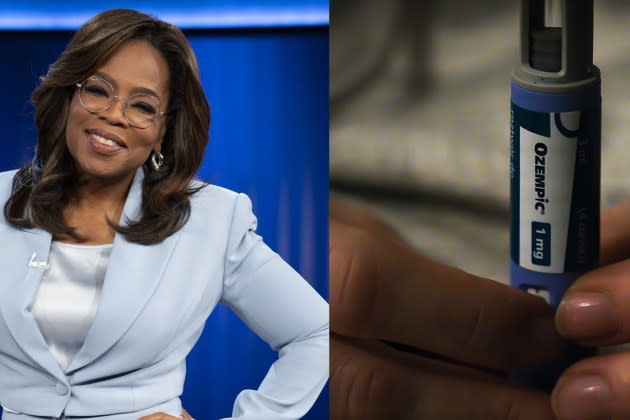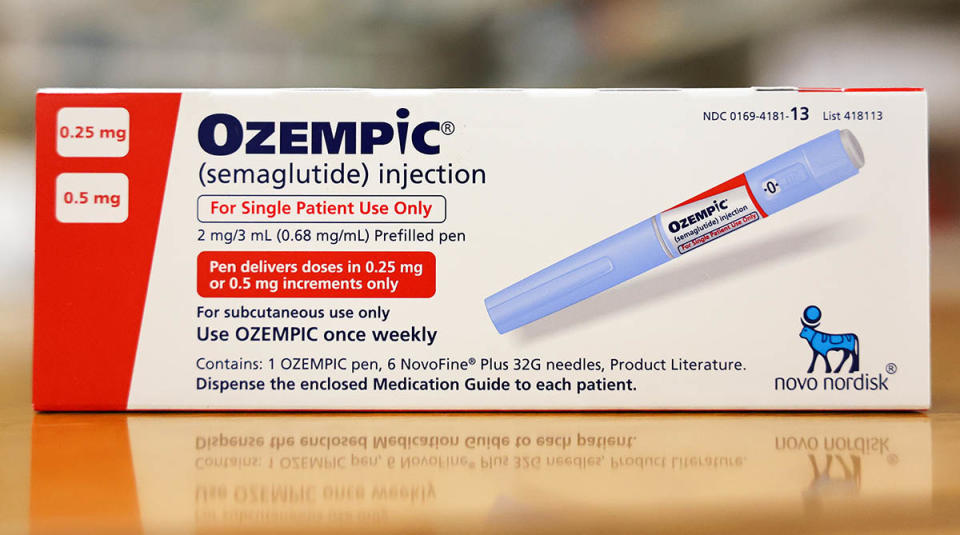Ozempic and the Oprah Effect: From Hollywood Vanity Diet to Mainstream Miracle Shot That’s Leading Obesity Intervention
- Oops!Something went wrong.Please try again later.

As the conversation around the use and demand for weight management drugs like Ozempic continue to grow, so have the misconceptions and the punchlines. But now, the class of prescription injectables has found an advocate in one of the most influential personalities of our time: Oprah Winfrey.
On Monday, Winfrey aired “Shame, Blame and the Weight Loss Revolution” on ABC — a forum that brought together leaders from the pharmaceutical industry, proponents of health care reform, medical experts and users who have transformed their lives through weight loss injectables. The goal: to eradicate stigma of being overweight and create awareness that obesity is a disease and a symptom of biology, not lifestyle.
More from WWD
Grover Rad Fashion Collection Takes on America's Complex Drug History
Proenza Schouler Lands in L.A. for Chateau Marmont Dinner With Saks

“I come to this conversation in the hope that we can start releasing the stigma and the shame and the judgment,” Winfrey said. “To stop shaming other people for being overweight or how they choose to lose or not lose weight, and more importantly to stop shaming ourselves.”
Winfrey said she experienced ridicule for her fluctuating weight in the public spotlight throughout her journey to manage her weight through different diets and exercise. “I took on the shame that the world gave to me for 25 years.”
She recalled an episode of her former talk show when she famously wheeled out a wagon that carried a bag of 67 pounds of animal fat as an example of the weight she had lost on a medically supervised liquid diet. “In an effort to combat all the shame, I starved myself for nearly five months…and after losing 67 pounds on a liquid diet, the next day, I started to gain it back. Feeling the shame of fighting a losing battle with weight is a story all too familiar.”
Her years-long journey included joining the board of WeightWatchers in 2015 after acquiring a 10 percent stake in the company. She left her role in February.
“I recently made the decision to not continue serving on the board of WeightWatchers,” Winfrey said. “I made that decision because I wanted no perceived conflict of interest for this special.”
WeightWatchers’ chief executive officer Sima Sistani was among the guests on the show. The company, which began in 1963 as a weight loss support group, later rebranded in 2018 into an overall health and wellness organization.
Much like Winfrey, the company’s understanding of being overweight or obese, and conditions that lead to it, have evolved.
Now, WeightWatchers has entered its next phase as a treatment program that also recognizes the role of biology, in addition to including programs for lifestyle and behavioral support, are the conduits to weight loss and wellness goals.
“We are the most clinically tested, evidence-based, science-backed behavior change program, but we were missing the third prong, which was biology,” Sistani said. “There could be somebody who needs medication because they have that biological underpinning, and what’s so important for us is to provide that care and also help people release the shame.”
Last year, the company acquired telehealth company Sequence, which specializes in prescribing weight loss medication.
“For all those people who took on the behavior change, some of them walked away without the success,” Sistani added. “And to those people, I want to say it’s not your fault.”

The special also brought together for the first time two major competitors that are expanding the pharmaceutical weight loss drugs conversation: Negelle Morris, senior vice president, cardiometabolic sales of Novo Nordisk Inc., the Danish company behind Ozempic and Wegovy, and Rhonda Pacheco, group vice president of diabetes and obesity for Eli Lilly, the American pharma company that manufactures and sells Mounjaro and Zepbound.
Although Ozempic received FDA approval in 2017, the drug didn’t go viral until years later, when it began circulating as a potential weight loss treatment via off-label treatment. Morris explained that even before Ozempic catapulted to virility on TikTok, Novo Nordisk was strategic about reframing the causes of obesity.
“It was actually over two decades ago, that Novo Nordisk made a stand that obesity is a disease, and that the shame that society keeps on people who are dealing with excess weight and obesity needs to stop,” Morris said. “And both of those things were equally important. I’ll say it over and over again, as someone who, still, myself, struggles with excess weight and obesity, I have to remind myself constantly, this is not a personal failing, even surrounded by all this education and data and doing what I do for a living.”
Alternatives to Ozempic are also gaining attention. As of February, the FDA lists Wegovy as having “limited availability,” citing “demand increase for the drug.” Both drugs are produced by Novo Nordisk Inc. In the past year, Ozempic bested all other brands in search queries by Google users. Comparisons of Mounjaro (Eli Lilly), Trulicity (Eli Lilly) and Rybelsus (Novo Nordisk), respectively, also generated the most interest. Recently, type 2 diabetes medication Victoza (Novo Nordisk), which is a daily injectable, has increased in Google search interest.
Semaglutide, the active ingredient in Ozempic and Wegovy, and tirzepatide, found in Mounjaro and Zepbound, are the specific compounds that promote weight loss.
According to a 2022 report by Trilliant Health, more than 9 million prescriptions were written for Ozempic, Wegovy and other weight loss medications. A majority of them were issued in the last months of 2023 as media attention continued to surge.
That same year, Ozempic represented 65 percent of prescriptions — and its cost is more affordable than Wegovy because of its FDA classification as a diabetes medication. Without insurance, Ozempic can cost around $900, and with insurance it can cost as low as $25. Comparatively, Wegovy is around $1,350 without insurance, and depending on the insurance provider, it can also cost around $25 — but the inclusion of obesity drugs in typical policies isn’t as common as diabetes.
Costs for Rybelsus, a diabetes medication, is on par with Ozempic. Mounjaro and Trulicity, which are also approved for diabetes, are only slightly higher, around $1,000.
Morris speculates that this variance in cost and accessibility is, in part, due to physicians not being properly informed about how the understanding of obesity as a disease has progressed.
“I think that that’s important to have that discussion,” Morris said during Winfrey’s TV special. “Access is complex, just like the disease itself is complex. The obesity medications are not covered to the same extent, and that’s why that out of pocket cost is what it is.”
According to the CDC, nearly 42 percent of adults in the U.S. are obese; and 11 percent of adults have diabetes (the organization estimates that 90 to 95 percent of all diabetes cases are type 2). While many insurance providers cover costs associated with diabetes, obesity isn’t recognized similarly as a disease, so it typically isn’t considered a standard benefit. Instead, only obesity-related comorbidities like heart disease, diabetes and cancer are treated.
“For ages it’s been considered a cosmetic problem, but we know now that it’s not a cosmetic problem, that it’s actually a real disease that people need treatment for,” said Angela Fitch, MD, president of the Obesity Medicine Association.
Semaglutide and tirzepatide work by slowing down gastric emptying, which creates the feeling of being full faster. Meanwhile, they also affect the brain, decreasing appetite centrally. Mechanically and neurologically, they mitigate the causation of overeating, Fitch said.
“It also works on your metabolism to a certain degree, meaning it changes the way your body sees and processes carbohydrates from a standpoint of the way it helps with insulin and regulation of insulin,” Fitch explained. “It’s working in the gastrointestinal tract, it’s working in the brain and it’s working in the pancreas. So, in working in all of those places, it really is more effective than some of our older medications.”
Semaglutide and tirzepatide do not burn fat, but they do help facilitate moving fat storage out of the body through a combination of physical activity and improved nutritional choices that can enhance its efficacy. “When you’re going around about your day — walking, doing your household chores, maybe you’re healthier, being physically active. Even better if you’re strength training and if you’re eating enough protein. There are right ways and wrong ways to lose weight. If you just take a medication and don’t eat, that’s not going to be helpful for you, you’re not going to feel good, you’re going to be fatigued, you might lose your hair.”
According to the National Institutes of Health, a study found that nearly one in three adults in the U.S. are overweight, and more than two in five adults have obesity. The World Health Organization contextualizes being overweight as “a condition of excessive fat deposits,” and a diagnosis of obesity as “a chronic complex disease defined by excessive fat deposits that can impair health,” adding, “obesity can lead to increased risk of type 2 diabetes and heart disease, it can affect bone health and reproduction, it increases the risk of certain cancers.”
While the benefits of Ozempic have been innovative in the treatment of obesity as a disease, it’s gained more attention as a vanity drug for its shrinking effects on celebrities and people using it as a get-skinny-quick tool for slimming down a few sizes.

Last year, Jimmy Kimmel’s opening monologue at the Oscars addressed the elephant in the room: “You look great, you all look great. When I look around this room I wonder, is Ozempic right for me?”
The punchline had an immediate effect, leaving netizens wanting to know more about the stars who were on the red carpet presenting with slimmer faces and waistlines.
Among Google’s trending queries following the awards show were “Oscars Ozempic,” “Ozempic Oscars 2023.” Many noted the seemingly slimmer appearances of Mindy Kaling and Lady Gaga on the red carpet, directly linking their names to the medication, spurring searches like “Mindy Kaling Ozempic party” and “Lady Gaga Ozempic.” Kaling and Lady Gaga have not addressed the use of weight loss medication.

Though the antidiabetic medication was already sparking conversations at the intersection of health and Hollywood, overnight, Google searches for “Ozempic” peaked in March following the Oscars, according to data from Google Trends. It marked the moment that Ozempic went mainstream.
Queries for “what is an Ozempic face” and “how to prevent Ozempic face” became breakout searches in Google over the past year. The term has been used to describe sagging skin and textural changes like wrinkles, under-eye hollows and looseness. The misconception fueled breakout searches over the past year. “Ozempic butt” became another turn of phrase that characterizes loss of volume in the buttocks after experiencing weight loss from the injectable.
Social media testimonials effectively became cautionary tales that amplified myths about Ozempic’s effect on skin laxity, which is typically a symptom of any form of rapid weight loss.
“I think that, anytime you lose weight, you can’t really say, ‘I want to lose it from my belly,’” Fitch said. “’Ozempic face,’ ‘Ozempic butt’ — that’s just because when we lose weight, we lose weight everywhere. And when you lose weight, a lot of people lose it in their face,” Fitch explained, adding that the areas of weight loss depend on genetics and other issues unique to the individual.
By June, Google searches for Ozempic reached a record high. That same month, a survey released by the American Academy of Facial Plastic and Reconstructive Surgery found that 60 percent of facial plastic surgeons reported an increase of patients presenting with “Ozempic face.” AAFPRS added that 20 to 25 percent of patients opted for treatment of “Ozempic face” with facial fillers over surgical options.
“Until now, we’ve been able to correct facial gauntness caused by extreme weight loss very easily with filler — but facial gauntness caused by Ozempic is a bit more complicated,” said Theda Kontis, MD, facial plastic surgeon and president of the AAFPRS, in a statement. “If the weight comes back, that filler can start to look very distorted if it has not been placed precisely.”
Social media also pushed the panic button on “Ozempic hair loss,” a misconception fueled by anecdotal videos. Some medical professions cite hair loss as multifactorial, and contributing factors can include genetics, everyday stress and extreme weight loss and nutritional deficiencies.
“We see hair loss with weight loss in general,” Fitch said. “So, if you’re losing weight, your body’s saying, ‘I’m starving in the wilderness,’ and your body’s like, ‘I’m not going to make hair because I don’t need hair.’ Hair is a product of being nutritionally sound as an entity. We have fuller, more robust hair, when we have good nutrition.”
Google queries for “what happens when you stop taking Ozempic” increased 300 percent.
Amid the news reports, social media virality and trending Google searches, some — but few — celebrities were speaking out. In fact, Sharon Osbourne revealed on the U.K. talk show “Loose Women” in January 2024 that she used weight loss injectables. “The injections that I was on, worked,” she said, “but it just seems that now I can’t put anything on, really.” The 71-year-old added she lost more than 40 pounds. “If I could, I would put on another 10.”
However, when some users of weekly Ozempic-like injectables end the treatment, they gain the weight back — or more — if lifestyle adjustments aren’t continued.
“If people are taking it for weight management, in the sense of obesity treatment, and let’s say they’ve lost 50 pounds while taking this medication, they do notice that they need to typically stay on it for the long term in order to maintain that weight reduction,” Fitch said. “So, the idea is, when the drug is gone from your system, you’re going to feel hungry…your body actually fights to drive your weight back up by nature.”
Fitch added that stopping the process means it’s going to create other neuro-chemicals and hormones that lead to regaining weight. “Working against that process, naturally, is very hard, which is why losing weight in the first place with exercise is so hard.”
Best of WWD

